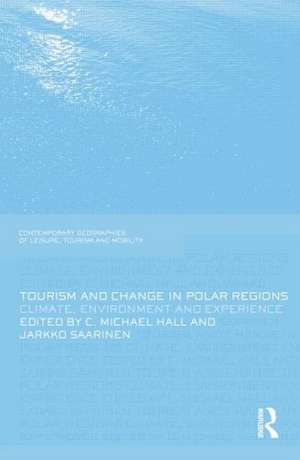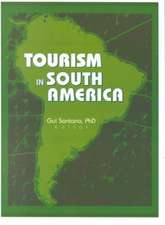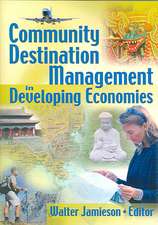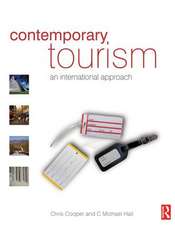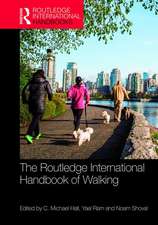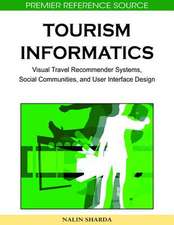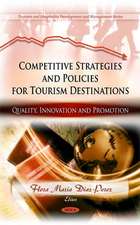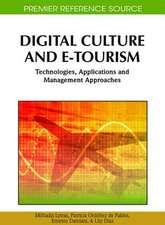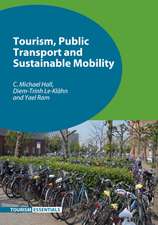Tourism and Change in Polar Regions: Climate, Environments and Experiences: Contemporary Geographies of Leisure, Tourism and Mobility
Autor Michael Hall, Jarkko Saarinenen Limba Engleză Paperback – 10 apr 2015
This timely volume provides a contemporary account of tourism and its impacts in polar regions. It explores the development and prospects of polar tourism, as well as tourism’s impacts and associated change at high latitudes from environmental, economic, social and political perspectives. It draws on cutting edge research from both the Arctic and Antarctic to provide a comparative review and illustrate the real life issues arising from tourism’s role in these regions. Integrating theory and practice the book fully evaluates varying perspectives on polar tourism and proposes actions that could be taken by local and global management to achieve a sustainable future for polar regions and development of tourism.
This complete and current account of polar tourism issues is written by an international team of leading researchers in this area and will have global appeal to higher level students, researchers, academics in Tourism, Environmental Studies, Arctic/Polar Studies and conservation enthusiasts alike.
| Toate formatele și edițiile | Preț | Express |
|---|---|---|
| Paperback (1) | 428.00 lei 6-8 săpt. | |
| Taylor & Francis – 10 apr 2015 | 428.00 lei 6-8 săpt. | |
| Hardback (1) | 1066.09 lei 6-8 săpt. | |
| Taylor & Francis – 14 iul 2010 | 1066.09 lei 6-8 săpt. |
Din seria Contemporary Geographies of Leisure, Tourism and Mobility
-
 Preț: 311.41 lei
Preț: 311.41 lei -
 Preț: 311.41 lei
Preț: 311.41 lei -
 Preț: 311.41 lei
Preț: 311.41 lei -
 Preț: 326.49 lei
Preț: 326.49 lei -
 Preț: 326.49 lei
Preț: 326.49 lei -
 Preț: 324.71 lei
Preț: 324.71 lei -
 Preț: 311.51 lei
Preț: 311.51 lei -
 Preț: 296.80 lei
Preț: 296.80 lei -
 Preț: 310.65 lei
Preț: 310.65 lei -
 Preț: 233.53 lei
Preț: 233.53 lei -
 Preț: 356.63 lei
Preț: 356.63 lei -
 Preț: 355.44 lei
Preț: 355.44 lei - 18%
 Preț: 1062.98 lei
Preț: 1062.98 lei - 18%
 Preț: 1057.40 lei
Preț: 1057.40 lei - 26%
 Preț: 850.91 lei
Preț: 850.91 lei - 18%
 Preț: 1168.76 lei
Preț: 1168.76 lei - 18%
 Preț: 1379.90 lei
Preț: 1379.90 lei - 18%
 Preț: 710.40 lei
Preț: 710.40 lei - 18%
 Preț: 1062.62 lei
Preț: 1062.62 lei - 18%
 Preț: 1222.85 lei
Preț: 1222.85 lei - 18%
 Preț: 1056.00 lei
Preț: 1056.00 lei - 18%
 Preț: 1223.89 lei
Preț: 1223.89 lei - 18%
 Preț: 1128.20 lei
Preț: 1128.20 lei - 18%
 Preț: 1056.00 lei
Preț: 1056.00 lei - 26%
 Preț: 765.43 lei
Preț: 765.43 lei - 18%
 Preț: 1055.51 lei
Preț: 1055.51 lei -
 Preț: 421.61 lei
Preț: 421.61 lei - 18%
 Preț: 1052.18 lei
Preț: 1052.18 lei -
 Preț: 422.04 lei
Preț: 422.04 lei - 18%
 Preț: 1223.21 lei
Preț: 1223.21 lei -
 Preț: 388.86 lei
Preț: 388.86 lei - 18%
 Preț: 1117.07 lei
Preț: 1117.07 lei - 18%
 Preț: 1056.35 lei
Preț: 1056.35 lei - 18%
 Preț: 1128.91 lei
Preț: 1128.91 lei - 18%
 Preț: 1062.62 lei
Preț: 1062.62 lei - 26%
 Preț: 822.54 lei
Preț: 822.54 lei - 18%
 Preț: 1119.16 lei
Preț: 1119.16 lei - 18%
 Preț: 1065.06 lei
Preț: 1065.06 lei - 26%
 Preț: 990.17 lei
Preț: 990.17 lei - 25%
 Preț: 851.27 lei
Preț: 851.27 lei - 18%
 Preț: 1342.20 lei
Preț: 1342.20 lei -
 Preț: 493.80 lei
Preț: 493.80 lei - 18%
 Preț: 1395.61 lei
Preț: 1395.61 lei - 26%
 Preț: 822.54 lei
Preț: 822.54 lei - 18%
 Preț: 1066.09 lei
Preț: 1066.09 lei
Preț: 428.00 lei
Preț vechi: 503.53 lei
-15% Nou
Puncte Express: 642
Preț estimativ în valută:
81.91€ • 85.29$ • 69.22£
81.91€ • 85.29$ • 69.22£
Carte tipărită la comandă
Livrare economică 10-24 martie
Preluare comenzi: 021 569.72.76
Specificații
ISBN-13: 9781138880665
ISBN-10: 1138880663
Pagini: 336
Ilustrații: 58 black & white illustrations, 19 black & white tables, 8 black & white halftones, 50 black & white line drawings
Dimensiuni: 156 x 234 x 25 mm
Greutate: 0.48 kg
Ediția:1
Editura: Taylor & Francis
Colecția Routledge
Seria Contemporary Geographies of Leisure, Tourism and Mobility
Locul publicării:Oxford, United Kingdom
ISBN-10: 1138880663
Pagini: 336
Ilustrații: 58 black & white illustrations, 19 black & white tables, 8 black & white halftones, 50 black & white line drawings
Dimensiuni: 156 x 234 x 25 mm
Greutate: 0.48 kg
Ediția:1
Editura: Taylor & Francis
Colecția Routledge
Seria Contemporary Geographies of Leisure, Tourism and Mobility
Locul publicării:Oxford, United Kingdom
Public țintă
PostgraduateCuprins
Part 1: The Context 1. Tourism and Change in the Polar Regions: Introduction – Definitions, Locations, Places and Dimensions 2. Tourism and Environmental Change in Polar Regions: Impacts, Climate Change and Biological Invasion Part 2: Tourism and Change in the Northern Polar Regions 3. Cruise Tourism in Arctic Canada: Navigating a Warming Climate 4. Climate Change and Polar Bear Viewing: A Case Study of Visitor Demand, Carbon Emissions and Mitigation in Churchill, Canada 5. Climate Disruption and the Changing Dynamics of Polar Bear – Human Interactions in Northern Ontario: A Case Study of Polar Bear Management in Polar Bear Provincial Park, Ontario, Canada 6. Cruise Tourist Experiences and Management Implications for Auyuittuq, Sirmilik and Quttinirpaaq National Parks, Nunavut, Canada 7. A Holiday on Ice on Hold? Nature-Based Tourism and Climate Change in the Nordic North 8. Sustainability and Emerging Awareness of a Changing Climate: The Tourism Industry’s Knowledge and Perceptions of the Future of Nature-Based Winter Tourism in Finland 9. Constraints and Opportunities in the Development of Diamond Tourism in Yellowknife, NWT Part 3: Tourism and Change in the Southern Polar Regions 10. Cultural heritage tourism in Antarctica and Svalbard: Patterns, Impacts, and Policies 11. Narratives of History, Environment and Global Change: Expeditioner-Tourists in Antarctica 12. "Awesome Size…Magnitude of the Place…the Incredible Beauty…": Visitors’ Onsite Experiences in the Ross Sea Region of Antarctica 13. Images of Antarctica and Ushuaia (Argentina) as a Gateway Port: Antarctic Visitors and Their Expectations 14. Business as (Un)Usual: Integrated Scenario Analysis for Tourism in Antarctica 15. Tourism, Conservation and Visitor Management in the Sub-Antarctic Islands Part 4: Conclusions and Future Issues 16. Contested Place and the Legitimization of Sovereignty through Tourism in Polar Regions 17. Last Chance to See? Future Issues for Polar Tourism and Change
Notă biografică
Michael Hall is Professor, Department of Management, University of Canterbury, New Zealand; Docent, Department of Geography, University of Oulu, Finland and Visiting Professor, Baltic Business School, Linnaeus University, Kalmar, Sweden. Co-editor of Current Issues in Tourism he has published widely in tourism and mobility, gastronomy and environmental history.
Jarkko Saarinen is Professor of Human Geography at the University of Oulu, Finland. His research interests include tourism development and its impacts and sustainability in peripheries. He is co-author of the book Nordic Tourism (2009), with C. Michael Hall and Dieter Muller.
Jarkko Saarinen is Professor of Human Geography at the University of Oulu, Finland. His research interests include tourism development and its impacts and sustainability in peripheries. He is co-author of the book Nordic Tourism (2009), with C. Michael Hall and Dieter Muller.
Descriere
Tourism is seen as one of the few economic opportunities in these regions but at the same time the polar regions are being opened up to tourism development they are being affected by a number of new factors that are interconnected to travel and tourism: climate change; landscape and species loss; increasing interest in energy resources and minerals; social changes in indigenous societies and a new polar geopolitics all bring into question the sustainability of polar regions and the place of tourism within them.
